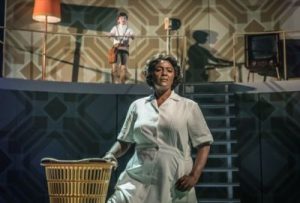
Farce is probably the hardest theatrical form to bring off. It requires speed, precision and impeccable timing. Amateurs beware. Congratulations, then, to the Lindley Players who, after a flat few minutes at the beginning create some pretty creditable comedy by grabbling Marc Comoletti’s 1960 classic and running with it full tilt.
Bernard (Kevin Monk – a nice mix of ruefulness and amorality) has three fiancées. He gets them from a friend in the fairly new mass flying industry at a time when air hostesses were hand picked for looks and charm. He keeps them apart, obviously, except – of course that he doesn’t. A six hander with six doors on stage (neat, colourful set by Tim Hinchliffe) means a great deal of dashing in and out just missing each other in true farce style.
Lucie Nash has fun – and is hilarious as the Germanically orgasmic, humourless Gretchen. Francesca Monk’s Gabriella is loud, angry and very Italian. The gentler clean-living but hard-eating American, Gloria (Gemma Conway) contrasts well with the other two just as Larry Dobin as Robert is a good foil for Monk’s character. Stereotyping it may be but that’s part of the joke.
Best of all is Cheryl Mumford as the French servant, Berthe who is anything but subservient. Mumford really captures her character’s outrageous gallic forthrightness and she times her lines, many of them triggering gales of spontaneous laugher, with enjoyable panache. She has a knack of commenting with her body too so that a shrug or a twitch often says it all and gets yet more laughs.
The costumes are good in this show (Pat Bressingham and Caroline Jordan). The girls work for three different airlines so we get Nash smart in yellow, Monk in red and Conway in turquoise. And, although, no voice coach is credited it is clear that this cast has worked hard on its accents – six different ones. Their efforts have paid off. Only very occasionally does the timbre of an accent adversely affect audibility and clarity.
Once again I am impressed by the versatility of The Lindley Players. The range of what they produce would put many a professional company to shame.
First published by Sardines http://www.sardinesmagazine.co.uk/reviews/review.php?REVIEW-Lindley%20Players%20Limited,%20The-Boeing%20Boeing&reviewsID=2861

 Well, it may have been deliciously familiar to an enthusiastic Canterbury audience of aficionados of the film starring Pauline Collins, but I came to this show as a Shirley Valentine virgin. Willy Russell’s immaculately, tenderly observed portrait of a frustrated (in every sense) 1970s Liverpool housewife is as moving as it is hilarious. And the observation of women’s experience is so acutely observed that it’s hard to believe that this is the work of a male playwright. Moreover, although the film (I gather) broadened out the concept it’s a real joy to see a beautifully written one person show which takes an idea, runs with it and develops it for two full hours.
Well, it may have been deliciously familiar to an enthusiastic Canterbury audience of aficionados of the film starring Pauline Collins, but I came to this show as a Shirley Valentine virgin. Willy Russell’s immaculately, tenderly observed portrait of a frustrated (in every sense) 1970s Liverpool housewife is as moving as it is hilarious. And the observation of women’s experience is so acutely observed that it’s hard to believe that this is the work of a male playwright. Moreover, although the film (I gather) broadened out the concept it’s a real joy to see a beautifully written one person show which takes an idea, runs with it and develops it for two full hours.



